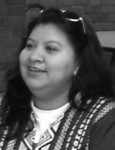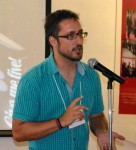Multilingual Justice: Beyond Translation
Session Type(s): Training
Training Tag(s): Grassroots Organizing/Campaigns
Starts: Friday, Jul. 17 12:00 PM (Eastern)
Ends: Friday, Jul. 17 1:15 PM (Eastern)
With recent uprisings of low-wage workers fighting against poverty wages, many grassroots organizers have a need to organize in a way that transcends barriers of language. Creating multilingual spaces in a consistent and inviting way can drastically change the culture and dialogue of an organization. But translation is not enough. Adopting a multilingual justice model takes translation to the next level. It challenges the privileged of holding conversation in any one language, and it opens participants hearts to other lived experiences. This training session will explain what a multilingual justice model is (and how it is different from translation), demonstrate what it looks like in action, and recommend strategies for adopting the model in your organization.
Trainers
Jeannette Huezo

For fourteen years, Jeannette has coordinated UFE’s popular education work and facilitated many workshops. She recently became UFE’s Executive Director after years advocating for multilingual justice at the organizational and movement level. Her experience implementing this type of model can address the organizational questions related to multilingual justice: funding, board support, and logistics. Jeannette’s first organizing job in United States was with the Latino Parents Association. She then went on to spend four years at the Coalition for Basic Human Needs (CBHN), organizing low-income women to fight for their rights. Then, Jeannette went to work for the Women’s Institute for Leadership Development (WILD) as the Program Director / Trainer / Organizer. Following that, she worked as a Union Organizer for Service Employees International Union (SEIU) Local 254, organizing immigrant workers like herself to find their voice as members of the labor movement.
Tony Macias

Currently a community interpreter/translator and language justice consultant, Tony has worked for 15 years in farmworker, labor, trade, anti-war, and immigrant rights movements in the US and Mexico. After serving as Assistant Director of Student Action with Farmworkers in North Carolina, he worked with Witness for Peace to lead delegations of US citizens to Mexico to explore the impacts of US-led policies and learn about creative alternatives to neoliberalism. He’s done language work for the past 7 years as part of a broad movement based in the US South that understands language as a key tool for resisting and building alternatives to structural oppression. Through that work, he co-founded the Austin Language Justice Collective, and has interpreted, translated, and led workshops across the US and Mexico. Along with other language workers, has collaborated closely with UFE over the past year to expand its multilingual justice efforts.